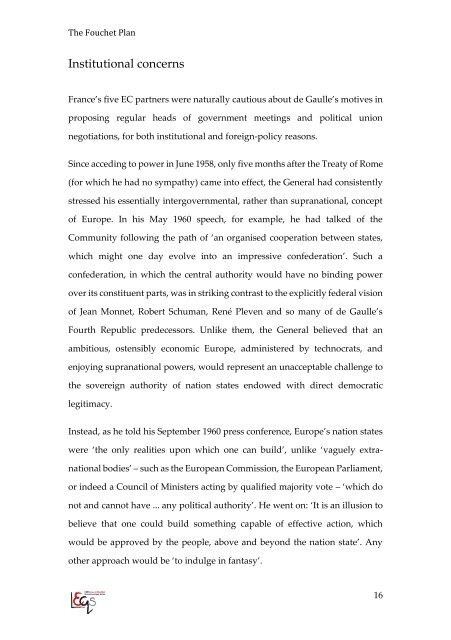The Fouchet Plan De Gaulle’s Intergovernmental Design for Europe
n?u=RePEc:eiq:eileqs:117&r=cdm
n?u=RePEc:eiq:eileqs:117&r=cdm
You also want an ePaper? Increase the reach of your titles
YUMPU automatically turns print PDFs into web optimized ePapers that Google loves.
<strong>The</strong> <strong>Fouchet</strong> <strong>Plan</strong><br />
Institutional concerns<br />
France’s five EC partners were naturally cautious about de <strong>Gaulle’s</strong> motives in<br />
proposing regular heads of government meetings and political union<br />
negotiations, <strong>for</strong> both institutional and <strong>for</strong>eign-policy reasons.<br />
Since acceding to power in June 1958, only five months after the Treaty of Rome<br />
(<strong>for</strong> which he had no sympathy) came into effect, the General had consistently<br />
stressed his essentially intergovernmental, rather than supranational, concept<br />
of <strong>Europe</strong>. In his May 1960 speech, <strong>for</strong> example, he had talked of the<br />
Community following the path of ‘an organised cooperation between states,<br />
which might one day evolve into an impressive confederation’. Such a<br />
confederation, in which the central authority would have no binding power<br />
over its constituent parts, was in striking contrast to the explicitly federal vision<br />
of Jean Monnet, Robert Schuman, René Pleven and so many of de <strong>Gaulle’s</strong><br />
Fourth Republic predecessors. Unlike them, the General believed that an<br />
ambitious, ostensibly economic <strong>Europe</strong>, administered by technocrats, and<br />
enjoying supranational powers, would represent an unacceptable challenge to<br />
the sovereign authority of nation states endowed with direct democratic<br />
legitimacy.<br />
Instead, as he told his September 1960 press conference, <strong>Europe</strong>’s nation states<br />
were ‘the only realities upon which one can build’, unlike ‘vaguely extranational<br />
bodies’ – such as the <strong>Europe</strong>an Commission, the <strong>Europe</strong>an Parliament,<br />
or indeed a Council of Ministers acting by qualified majority vote – ‘which do<br />
not and cannot have ... any political authority’. He went on: ‘It is an illusion to<br />
believe that one could build something capable of effective action, which<br />
would be approved by the people, above and beyond the nation state’. Any<br />
other approach would be ‘to indulge in fantasy’.<br />
16


